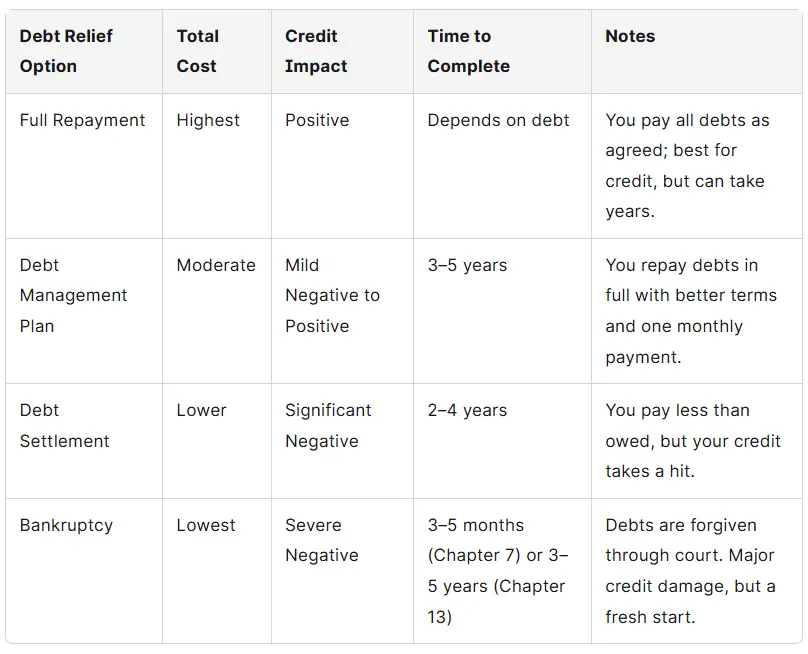
Finding the right way to deal with overwhelming debt can be tough. With so many terms being used—like debt management, debt settlement, debt consolidation, and bankruptcy—it’s important to know what each option really means. This guide will walk you through the differences between debt management and debt settlement, and show how they compare to other debt relief strategies. We’ll also explore how these options impact your credit score, monthly costs, and financial future.
A debt management plan (DMP) is a structured program to help you repay your debt in full, but with better terms. It’s usually set up through a credit counseling agency, which works with your creditors to lower your interest rates, waive late fees, and set up one simple monthly payment.
Under a DMP, you don’t borrow new money. Instead, you work with a credit counselor who contacts your lenders on your behalf. Most of your credit card debt, medical bills, and personal loans can be included in the plan. These programs usually take about 3 to 5 years to complete.
You still repay all of your debt, but in a more manageable way. You may even finish paying it off faster than you would on your own.
For more on when this might be the right choice, read When Should You Consider a Debt Management Plan?
Debt settlement is very different from debt management. Instead of paying off your full balance, you try to settle for less than you owe. This usually means you stop making payments on your debts, which can lead to missed payments, late fees, and debt collection calls.
Once your debts are severely past due, your creditors may agree to settle for a lump sum payment that’s less than the original balance. This can reduce your total debt, but it comes with major risks to your credit history and may lead to tax consequences if the forgiven debt is large enough.
Not all creditors will agree to settle. You also have to be careful: Is Debt Settlement a Good Idea? explains how to avoid debt relief scams and high upfront fees from some debt settlement companies.
Here’s a simple way to understand the key difference:
A debt management plan helps you stay current on your accounts and protects your credit score. In contrast, debt settlement involves falling behind on purpose, which leads to negative marks on your credit report.
Both may involve working with an outside organization, but the goals and processes are completely different.
Debt consolidation means rolling several debts into one new loan. This is different from a repayment strategy; it’s actually borrowing more money to pay off what you already owe. This might seem like a fix, but it can be risky. If you get a debt consolidation loan with a long repayment period, you may end up paying more in interest rates over time.
We don’t recommend debt consolidation loans for people trying to reduce debt. In most cases, you’re trading one type of debt for another and possibly paying more in the end. The same goes for using a home equity loan to consolidate debt; it puts your home at risk and doesn’t reduce what you owe.
To learn more about dangerous types of credit, read 6 of the Worst Types of Loans You Should Never Get
Most unsecured debt—like credit card debt, medical bills, and personal loans—can be addressed through debt management or debt settlement.
Here’s how it usually breaks down:
Yes, but not in the same way.
If your goal is to protect your credit, credit counseling and debt management are much safer than settlement.
Credit counseling organizations are nonprofit groups that help people understand their financial situation and explore options like budgeting, repayment plans, and debt management.
They do not charge high monthly fees or upfront fees like many for-profit debt settlement companies. Instead, they provide tools to help you create a plan and stick with it.
To see how this works, try our free Roadmap to Financial Freedom course to learn how a DMP can work for you.
When choosing how to handle your debt, it helps to see how each strategy compares in key areas like cost, credit impact, and time to completion. Below is a table that summarizes four common options: full repayment, a debt management plan, debt settlement, and bankruptcy. These options are listed from most to least expensive and from least to most damaging to your credit.

Bankruptcy is typically a last resort, but for some, it can be the most realistic path out of debt. If you have overwhelming debt and no income to repay it, this option may wipe the slate clean.
There are two common types of personal bankruptcy:
Bankruptcy severely hurts your credit, stays on your report for 7 to 10 years, and can affect your ability to borrow money or rent housing. However, it also ends collection calls, lawsuits, and garnishments.
For legal guidance, the U.S. Courts official bankruptcy basics page is a helpful starting point.
Most debt settlement companies are for-profit businesses that charge high fees. Many require you to deposit money into a special account and stop paying your creditors. The company then attempts to negotiate on your behalf using those funds.
There are a few red flags to watch for:
Be especially cautious if a company asks you to ignore collection letters or court notices. If you decide to pursue settlement, be sure to fully understand what happens if the negotiation fails. Not all creditors will agree to settle, and you may end up deeper in debt.
The Consumer Financial Protection Bureau offers unbiased information about how debt settlement works and what to watch out for.
Credit counseling agencies are typically nonprofit organizations that provide free or low-cost services. They help consumers:
These agencies don’t push you into one solution. Instead, they give you clear information and help you make an informed decision. Their counselors are trained and certified to evaluate your financial position and recommend a safe path forward.
For more on how this works, see What is Debt Counseling and How Can It Help You?
-min.webp)
Each debt relief strategy impacts your credit score differently:
To better understand what affects your score, read What is a Credit Score and How is it Calculated?
If any portion of your debt is forgiven, the IRS may consider the canceled amount as taxable income. This is most common with debt settlement and may also occur in bankruptcy cases.
You’ll likely receive a Form 1099-C from your creditor. Unless you qualify for an exception, like being insolvent at the time of the debt forgiveness, you may have to pay income tax on the amount forgiven.
For IRS rules on canceled debt, see their official publication.
We don’t recommend debt consolidation loans for people who are trying to get out of debt. These loans often come with lower initial payments, but you may end up paying much more over time due to extended terms and interest. Even worse, they require good credit to qualify, which many people in debt don’t have.
Some lenders also offer secured consolidation loans, such as a home equity loan. This is especially risky because it puts your house on the line. If you fall behind, you could lose your home.
Instead of using new loans to deal with old debt, look for repayment options that don’t involve borrowing more.
If you’re unsure whether you need help with debt, there are a few warning signs to watch for:
If any of these apply to you, it may be time to seek help from a credit counseling agency. You don’t have to wait until things spiral out of control. Getting ahead of the problem can help protect your credit history and give you better options.
Deciding between a debt management plan and debt settlement comes down to your personal situation. Here are some helpful questions:
If you’re still unsure, consider reading Pros and Cons of Paying Off Old Delinquent Credit Card Debt
Some people choose to speak with a financial advisor before selecting a debt relief strategy. Advisors can help you understand your financial situation, set goals, and create a long-term plan. However, they often charge fees and may not be equipped to help with active debt management or settlement.
A better first step might be connecting with a nonprofit credit counselor who offers free or low-cost help. These professionals can explain your options clearly and give you a written repayment plan based on your income, existing debts, and monthly expenses.
No. A credit repair company typically helps dispute items on your credit report, such as errors or outdated information. They do not reduce your actual debt or help you create a payment plan.
While credit repair can help improve your credit in some cases, it’s not a replacement for a debt management plan or other structured approach. If your credit issues are caused by late payments, high balances, or enrolled debt, then credit repair alone won’t solve the problem.
Unfortunately, people looking for help with debt are often targeted by scammers. Common scams include:
To avoid falling victim, always research the company and check reviews with trusted sources like the Federal Trade Commission. If something seems too good to be true, it probably is.
For most people, the safest way to get out of debt is to work with a nonprofit credit counseling agency. We offer confidential advice and support without pressure or hidden fees. We’ll help you understand:
To start, explore our free courses like the Budgeting 101 1Course or Power of Paycheck Planning to take control of your finances today.
When you're ready to chart your course to financial freedom, call us today for a free, confidential session with a certified counselor.